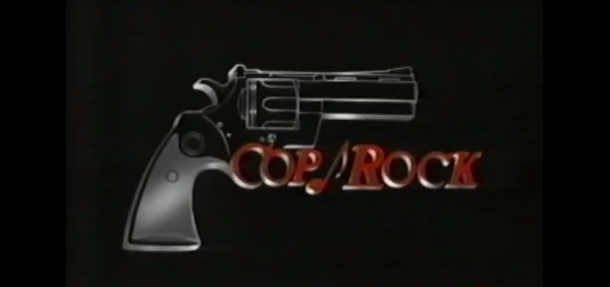Twenty-three years ago Thursday, the weirdest network television program of the modern era made its debut on ABC. The show had the guts to ask a question that had been on nobody’s mind: What would you get if you merged the grit of a police procedural with the whimsy of a Broadway musical? Over eleven exceedingly strange episodes, it answered that question, to the delight of everyone who had ever watched West Side Story and wished for less Tony and Maria and more Officer Krupke. The show involved cops who not only solved crimes, but also knew how to rock. The name flowed naturally from there: Cop Rock.
I’d have liked to have been in the pitch meeting when show co-creator Steven Bochco, still riding the success of Hill Street Blues and L.A. Law, made his case for the series. “We’re gonna deal with real, urban issues, like drugs, and gangs, and police brutality. We’re gonna bust down doors, shoot off our guns. And then, when tensions are at their highest, we’ll resolve them in song! (beat, satisfied smile) And also it stars America’s sweetheart, Ronny Cox.” If you or I had pitched this idea, we would have been met with patronizing smiles, and, later, a restraining order. But Bochco was a star, and television executives are sometimes willing to indulge their stars’ outlandish ideas. ABC ordered the series.
They quickly wished they hadn’t. The first episode opened with an intense scene of cops making an arrest, which quickly morphed into a bunch of street toughs taunting the cops with a singsong rap about the revolving-door justice system. (“Step up, chump! Let’s see what you got! Gonna be comin’ for you, ready or not. Tomorrow morning, we’re gonna be free! You better be watching your back!”)
Later, there was a soulful courtroom number called “He’s Guilty,” in which judge and jurors turned to song to inform a criminal defendant that he was going to prison.
It all wraps up at twilight, on a filthy public bench, as a heroin addict serenades her baby with a tender ballad about the Sandman, and how he will soon shower them both with his magical, sleep-inducing powder that provides an escape from this “great, big, dirty world.”
I like to imagine Bochco watching that first episode when it aired, nodding sagely to himself, and thinking “Nailed it.” He could not have been more wrong. The critics were brutal. The public was baffled; Bochco admitted to the New York Times that “viewers seemed unwilling to accept the incongruous format.” Who could blame them? The juxtaposition of realism and musical whimsy was incredibly jarring, and occasionally offensive. Cop Rock lasted eleven episodes before it was yanked for good in December 1990—and it went out in its own inimitably weird metatextual style, with everyone breaking character—“I can’t believe they cancelled us,” one cop says. “Yeah, I know, I only got to sing one song,” another responds—and crewmembers coming out from behind the scenes to join the cast in one final number.
If Cop Rock had been the last thing Steven Bochco ever produced, the show would be Hollywood legend by now, a cautionary tale of how hubris and insanity can ruin a career. Instead, three years later, he went on to co-create the wildly popular cop show NYPD Blue—which lasted for more than a decade, and which featured no singing whatsoever—and Cop Rock was forgiven and forgotten. Twenty-three years later, it’s still not clear what, exactly, Cop Rock was, or where it came from. It has never been released on home video or DVD, and today exists primarily as a punchline, or a fever memory. It deserves better.
In real life, crime is brutal and police work is tedious. It’s dramatic in the way an autopsy is dramatic: the deeper in you go, the messier and sadder it gets. A show about the real mechanics of crime and punishment would alienate viewers—The Wire, which came close, was tremendously unpopular during its five-season run on HBO— which is why Hollywood makes cop shows more palatable by broadening characters, minimizing bloodshed, and forcing neat resolutions.
After spending so many years on Hill Street Blues and L.A. Law, Bochco must have been tired of the artifice of the law-and-order genre. Maybe I’m giving him too much credit, but I like to think of Cop Rock as Bochco’s frustrated response to the demands of the networks and the viewing public, a commentary on how we insist on deriving prime time entertainment from horrible things. Cop Rock took Hollywood’s fatuous process of softening sharp edges and pushed it out to its ultimate logical extent.
Crime is Slate’s crime blog. Like us on Facebook, and follow us on Twitter @slatecrime.
